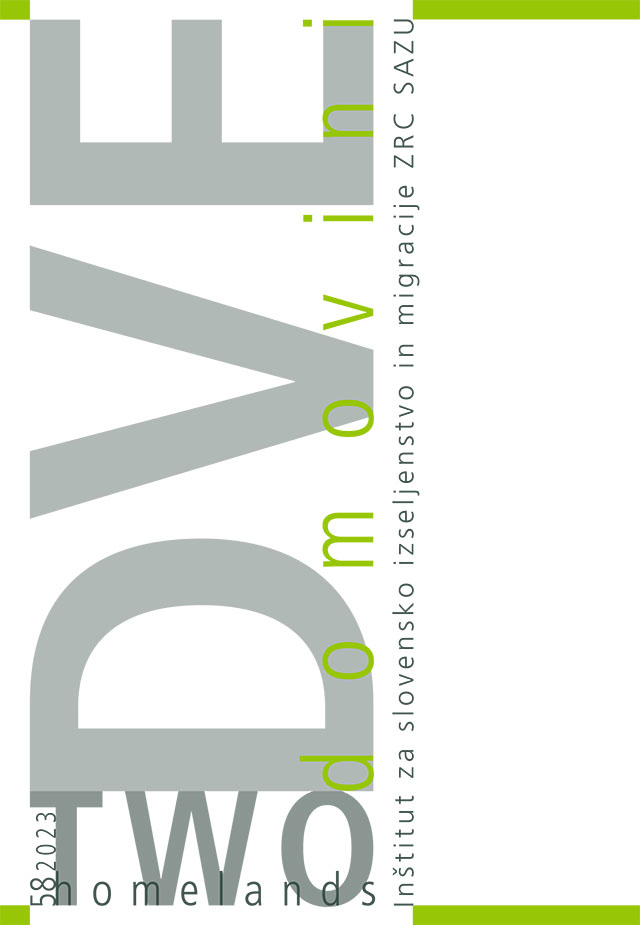Representations of Home and Longing for Home in the Processes of the Nationalization of Slovenian Folk-Pop Music
DOI:
https://doi.org/10.3986/dd.2023.2.03Keywords:
home, homeland, nationalization, migrations, Slovenian folk-pop musicAbstract
The nationalization of music is more intense in those musical genres that the nation recognizes as traditional. Experts, performers, creators, cultural policy, consumers, and mass media play an important role in this context. Home and homeland are dominant markers of national belonging in their representational image. However, in the contemporary context of migration, the notion of home has also acquired new conceptual frameworks. Based on the findings of contemporary home studies in the milieu of migration, the article compares them with its representations in Slovenian folk-pop music, where home, homeland, Slovenia, longing, mountain, Slovenian places, and mother appear as dominant markers of the national.
Downloads
References
Adorno, T. W. (1986). Uvod v sociologijo glasbe. Državna založba Slovenije.
Anderson, B. (1998). Zamišljene skupnosti: O izvoru in širjenju nacionalizma. Studia humanitatis.
Barber-Keršovan, A. (1999). Na sledi kulturni identitete – Kaj je »slovenskega« v slovenski rock glasbi? Glasnik Slovenskega etnološkega društva, 39(1), 4−9.
Bedina, K. (1999). Odnos Slavka Osterca do ljudske pesmi in nacionalizma v glasbi. Traditiones: zbornik Inštituta za slovensko narodopisje, 28(2), 281−287.
Besedilo.si – Slovenska glasbena besedila (b. n. d.). Pridobljeno na https://www.besedilo.si
Brujić, M. (2020). “There’s No Place Like Home”: Female EU Migrants in Belgrade. Dve domovini / Two Homelands, 52, 25−41. https://doi.org/10.3986/dd.2020.2.02
DeNora, T. (2000). Music in Everyday Life. Cambridge University Press. https://www.academia.edu/10056207/De_Nora_Music_in_Everyday_Life
Ferbežar, I. (1995). Besedila Avsenikovih narodnozabavnih popevk 1953−1985 ali popevčice milemu narodu. Traditiones: zbornik Inštituta za slovensko narodopisje, 24, 331−339. https://www.dlib.si/stream/URN:NBN:SI:DOC-YY5HL1DO/f51243e8-ec76-406a-9b70-e9ea62fadb71/PDF
Gabrovec, A. (2016). Vloga glasbe pri konstrukciji nacionalne identitete: slovenska nacionalna identiteta z glasbene perspektive [Diplomsko delo, Univerza v Ljubljani, Fakulteta za družbene vede].
Golob, T. (2009). Slovenian Migrants in Transnational Social Spaces: Exploring Multilayered Identifications and Ambivalent Belongings. Anthropological Notebooks, 15(3), 65–77.
Golob, T. (2010). Predstave doma v pripovedih slovenskih in irskih povratnih – transnacionalnih migrantov. Glasnik Slovenskega etnološkega društva, 50(1), 2, 5−12.
Hafner-Fink, M., Kurdija, S., Malnar, B., Uhan, S., & Stanković, P. (2022). Slovensko javno mnenje, 2021/1: Ogledalo javnega mnenja, Stališča o zdravju in zdravstvu (ISSP 2021), Stališča o tožilstvu in pravosodju, Šport, Glasba [Podatkovna datoteka]. Univerza v Ljubljani, Arhiv družboslovnih podatkov. ADP - IDNo: SJM211. https://doi.org/10.17898/ADP_SJM211_V1
Hield, F., & Price, S. (2018). “I realised it was the same song”: Familiarisation, assimilation and making meaning with new folk music. The International Journal of Traditional Arts, 2, 1–23.
Kumer, Z. (1996). Vloga, zgradba, slog slovenske ljudske pesmi. ZRC SAZU.
Jercog, A. (2008). S polko v svet: glasbene poti bratov Avsenik. Založba Avsenik.
Jercog, A. (2017). Slavko Avsenik: življenje za glasbo. Mladinska knjiga.
Juvančič, K. (2005). The popularization of Slovenian folk music between the local and global: redemption or downfall of national heritage. Traditiones, 34(1), 211–215. https://doi.org/10.3986/Traditio2005340117
Mauwa, C. (2020). Influence of traditional musics in modern genres. Ethnomusicology University of KwaZulu Natal, julij 2020, 1−9. http://dx.doi.org/10.13140/RG.2.2.19041.12648
Milharčič Hladnik, M. (2009). Moje misli so bile pri vas doma: Poti prehodov v pismih. V M. Milharčič Hladnik & J. Mlekuž (ur.), Krila migracij: Po meri življenjskih zgodb (str. 23−58). Založba ZRC, ZRC SAZU.
Ministrstvo za kulturo (2017, 7. marec). Register nesnovne dediščine – enota: Narodno-zabavna glasba, 1−3. https://www.gov.si/assets/ministrstva/MK/DEDISCINA/NESNOVNA/RNSD_SI/Rzd-02_00057.pdf
Muršič, R. (1993). Neubesedljive zvočne igre: od filozofije k antropologiji glasbe. Akademska založba Katedra.
Omerzel Terlep, M. (1999). Zvočna identiteta slovenskih pokrajin. Anthropos, 31(4−6), 278−282.
Pamukova-Saveska, G. (2014). The Notion of Home and Its Role in the Identification of the Self through National Identity: Silyan the Stork and the Black Hole of the Macedonian Identity Narration. Култура/Culture, 7, 103−112. http://journals.cultcenter.net/index.php/culture/article/view/34
Pompe, G. (2012). Ideologija v glasbi in ideologija o glasbi. V A. Bjelčevič (ur.), Ideologije v slovenskem jeziku, literaturi in kulturi (str. 77−82). Znanstvena založba Filozofske fakultete.
Sivec, I. (2002). Tisoč najlepših besedil. ICO.
Smith, A. D. (1991). National Identity. Penguin Books.
Stanković, P. (2021). Simbolni imaginarij sodobne slovenske narodnozabavne glasbe. Založba FDV.
Šaver, B. (2005). Nazaj v planinski raj: alpska kultura slovenstva in mitologija Triglava. Založba FDV.
Toplak, K. (2004). »Dobrodošli doma?« Vračanje slovenskih izseljencev v Republiko Slovenijo. Dve domovini / Two Homelands, 20, 35−51. http://twohomelands.zrc-sazu.si/sl/articles/show/136/dobrodoli-doma-vraanje-slovenskih-izseljencev-v-republiko-slovenijo
Walsh, K. (2006). British expatriate belongings: mobile homes and transnational homing. Home Cultures, 3(2), 123−144. https://www.researchgate.net/publication/233562095_British_Expatriate_Belongings_Mobile_Homes_and_Transnational_Homing
Wyman, M. (2001). Return migration – old story, new story. Immigrants & Minorities, 1(20), 1−18. https://www.researchgate.net/publication/233030025_Return_migration__old_story_new_story
Downloads
Published
How to Cite
Issue
Section
License

This work is licensed under a Creative Commons Attribution-NonCommercial-NoDerivatives 4.0 International License.
Authors guarantee that the work is their own original creation and does not infringe any statutory or common-law copyright or any proprietary right of any third party. In case of claims by third parties, authors commit their self to defend the interests of the publisher, and shall cover any potential costs.
More in: Submission chapter





